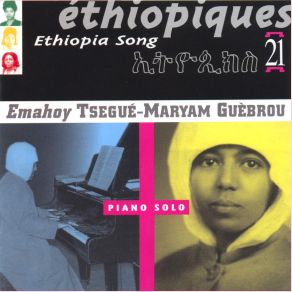Éthiopiques, Vol. 21: Piano Solo / Ethiopiques, Vol. 21: Piano Solo
Download links and information about Éthiopiques, Vol. 21: Piano Solo / Ethiopiques, Vol. 21: Piano Solo by Tsegue-Maryam Guebrou. This album was released in 1963 and it belongs to Blues, Gospel, Jazz, World Music genres. It contains 16 tracks with total duration of 01:14:28 minutes.

|
|
|---|---|
| Artist: | Tsegue-Maryam Guebrou |
| Release date: | 1963 |
| Genre: | Blues, Gospel, Jazz, World Music |
| Tracks: | 16 |
| Duration: | 01:14:28 |
| Buy it NOW at: | |
| Buy on iTunes $8.99 | |
Tracks
[Edit]| No. | Title | Length |
|---|---|---|
| 1. | The Homeless Wanderer | 7:07 |
| 2. | The Last Tears of a Deceased | 8:29 |
| 3. | A Young Girl's Complaint | 6:10 |
| 4. | The Mad Man's Laughter | 3:57 |
| 5. | Presentiment | 3:43 |
| 6. | Mother's Love | 3:39 |
| 7. | Ballad of the Spirits | 5:55 |
| 8. | The Song of the Sea | 9:32 |
| 9. | Homesickness | 3:51 |
| 10. | Golgotha | 5:11 |
| 11. | The Jordan River Song | 2:37 |
| 12. | The Garden of Gethesemanie | 3:24 |
| 13. | Homesickness | 3:13 |
| 14. | The Story of the Wind | 2:46 |
| 15. | Evening Breeze | 2:51 |
| 16. | Tenkou Why Feel Sorry | 2:03 |
Details
[Edit]The French imprint Buda Musique has done intellectually adventurous music fans a remarkable service with its expansive Éthiopiques series, a group of releases largely dedicated to documenting the thriving Ethiopian music scene of the late ‘60s and early ‘70s. While many have fallen in love with the sinuous instrumental virtuosity of artists like Mulatu of Ethiopia or the eerily gorgeous vocal stylings of Tlahoun Gessesse, they offer little in the way of preparation for these remarkable solo piano recordings. Emahoy Tsegué-Maryam Gébrou was born into a wealthy Ethiopian family and educated in classical composition before entering an Amharic monastery at the age of 19. During her tenure there she devoted most of her time to the composition of the pieces included on this collection. Though they bear evidence of her preoccupation with the works of Eastern European composers like Chopin and Bartok, they borrow melodic themes from Ethiopian folk tunes. Emahoy drew much of her inspiration from Biblical themes and from Ethiopia’s forbidding landscape, and compositions like “Golgotha” and “The Song of the Sea” are possessed of a singular majesty that occasionally recalls the works of 18th-century Romantic composers.